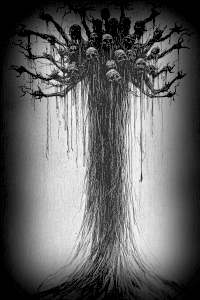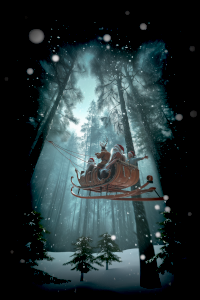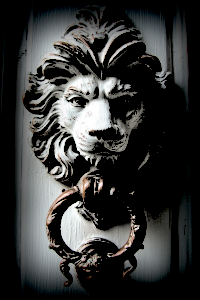A little ambiance while you read. Songs curated by the authors.

Hunger
by Dom Sabasti

Maniacal mischief strikes hardfest in the hearts of those with passionate pursuits. My maniac is buried. Whole heartedly, my passions are incomplete.
***
I slid back into the rotting wicker rocker, and wrote. As felt from my seat, my heart aches. I hear it weep from within. And to no relief, for the ailment is eternal. The hunger for which there is no satisfaction.
***
Fields of angels
Burning alive
Skewered atop every tree
Of every forest.
The screaming hum
Heard ‘round the world.
Hell has taken over.
Earth is ablaze with heaven.
Lucifer cries.
***
I opened myself to the blade
My darkest secrets pouring out
I showered the earth with my blood
My carnal self showing doubt
I opened myself deeper
My flaccid hands
Searching inside
With sinister hope
I found my prize
My life
Held in my hands
In simplest joy
I squeezed
***
I stumbled into her gaze,
An accidental obstruction
To her mental raping.
She caught hold of my aura,
Ripping it to ribbons
Of writhing ecstasy.
My soul regurgitated an essence,
So pure of truth
As to disintegrate my capture.
All thought became undone.
My emanation yielded to her darkness,
And a peace withheld the beauty.
***
Unsure of her chaotic placement
Unsure as to the sincerity of intent
Barely a hemisphere
Of rectal integrity
Her hands
Caressing the synthetic vessels
Chemical orgasms
Spewing trapped air
Intricate emptiness
Pitifully pagan
Check out our sister site: The Fabula Nosh Cafe

There is no Santa Claus
by Michel Croteau

Christmas was coming and I knew that my husband Mike was going to invite to our Christmas dinner his old uncle Leopold like every year and every year I begged him not to invite him.
“Please dear let’s have a nice traditional festivity without that scroogy uncle of yours. He is malignant miser that has no Christmas spirit and doesn’t believe in Santa Claus… he upsets the children yelling that there is no Santa Claus just because he doesn’t want to bring anything for us and especially no gifts for our boys…. But he still comes to stuff his face with our food… please don’t let him ruin another Christmas!”
”Come-on darling don’t be petty… the poor old guy doesn’t have nobody to spend Christmas with… he has only us… I know… I know that he can be quite unpleasant… some time but let’s be the adults ones… he had a hard life” my naïve husband commented.
“A hard life? Really? Are you kidding?” I yelled back to him “He has been a conman all his life defrauding his employees… accumulating money that who knows where he is hiding and making believe that he is so poor that can’t afford a nice house and decent leaving… every time we visit him, he offers us only some stale peanuts while when he comes here eats like a pig… still I wouldn’t care about all this if he only would show some Christmas spirit and stopping say that there is no Santa Claus.”
“Sweety it’s only once a year… be kind!” Mike implored.
“All right I will tolerate his obnoxious presence for your sake… “
Once again, I capitulated, and stingy Uncle Leopold came to spend Christmas day with us. On Christmas day we all gathered around the Christmas tree to open our presents.
“Uncle Leopold what Santa Claus brought you?” the kids my two boys five and seven years old asked running to embrace him… uncle Leo while stuffing his face with the candies from the Christmas socks hanging on the mantle of the fireplace yelled at them “Nothing… there is no Santa Claus.”
“Mom is a true that there is no Santa Claus?” My two boys ran to me almost in tears. I consoled them embracing them “Sure there is Santa Claus, but you see my darling uncle Leo forget to write to Santa Claus… and then I added with badly repressed anger “isn’t that true uncle Leo?” and he being annoying as ever muttered “Why should I? there is no Santa Claus and what is all this nonsense… decorations… a pine tree?… woman you‘re wasting money.” I gave a dirty look at my husband, and he answered me with a begging smirk.
After we had a sumptuous dinner the kids played with their presents, and we played games until bedtime. When I went to say goodnight to Uncle Leo and finally tell him to go home, I couldn’t wake him up… he had slumbered in an armchair like a sack of potatoes. He had too much to eat and had made himself very merry with our liquor.
“Darling, I think that it’s useless… we have to putting him in bed in the guest room.” My husband suggested.
So, we put him in bed and went to our bedroom to rest after such a stressful day but only after a few minutes I heard a big commotion coming from the guest room. What was going on?-I wondered- was Uncle Leo destroying the guest room in a drunk stupor?
“Wake up… wake up Mike.” I screamed at my husband who had already fallen asleep… “go see what uncle Leo is up to.”
After many ‘’you go… no you go’’ and the commotion getting louder and Uncle Leo screaming” let me go… let me go”… we ran to his room.
The bed was empty… and the window was open… we rushed to close it but while we were fighting snow drifting inside… we saw a slaid driven away by deer… a big man in red and many little elves restraining Uncle Leo who was screaming “ let me go… let me go… I am freezing.”
Those were the last words that we ever heard from Uncle Leopold.

The Glimmergate Inn
by KA Stefana

I could smell the most amazing aromas as I walked down the sidewalk toward the front door to the Glimmergate Inn. As my stomach rumbled in anticipation of a turkey feast, I noticed the dilapidated shutters and the wilting flowers. The inn had an air about it that sent shivers down my spine.
Ignoring the warning signs to stay away, I struggled with my suitcase, dragging it up each step until I stepped onto the wraparound porch. The rocking chair gently moved back and forth, but I once again ignored the warning signs.
There wasn’t a breeze in the air!
Approaching the front door, I raised my hand to the gaudy lion-head door knocker but stopped when I realized the front door was ajar.
Leaving my suitcase on the porch, I peeked in and scanned the front hall for signs of the proprietor. When I didn’t see anyone, I pushed the door open and stepped into the grand foyer with its high ceilings and exquisite eighteenth-century portraits.
The smells coming from the kitchen were tantalizing. I momentarily forgot that I wasn’t home as I started walking down the hall, searching for this magnificent feast.
With each step into the hall, I felt the portraits were following me. Slowly, I stopped and turned around, watching as the front door creaked closed and the locks twisted into their locked positions.
The fact that the lock mechanisms functioned without someone slipped my mind as I remembered the feast I needed to devour.
I crossed the threshold into the dining room and smiled as I noticed that the table was set for one. The golden plate sparkled in the candlelight as shadows danced across the room.
Flames danced in the fireplace. The crackling of the fire helped me forget the silence that filled the inn. Instead, my eyes caught the boughs of holly and golden ornaments nestled between. Red berries added a splash of Christmas cheer to the desolation hidden within these four walls.
Before I raced into the kitchen, I stepped into the living room with its grand tree standing proudly in front of the bay windows. The star proudly sat snug atop the tree, and the white lights radiated through the room. As the lights twinkled upon the walls like fireflies, I searched for the presents under the tree.
There were at least twenty gifts wrapped in ornate paper with large bows and ribbons. I felt like I was standing in a portrait from days long ago. An eerie feeling settled in my bones, and sensing time had stopped moving forward between these walls.
Shaking off my wayward thoughts, I knelt beside the tree and read each name on the gifts. My name appeared on several packages, but I explained it away so it all seemed rational. After all, I had booked a weekend at the inn. It was just something the proprietor did for all the guests. Wasn’t it?
Standing up, I decided to wait to open my gifts. I wanted to meet the chef and dine on their amazing food.
Trying not to get distracted, I headed straight for the kitchens and leaned against the archway in hopes that the staff would appear and serve me dinner.
I could almost taste the moist turkey in my mouth. Oh! The mashed potatoes and green beans! Roasted carrots! Homemade bread with honey butter! What a feast! Each dish sat on the counter, calling my name.
This was a feast fit for a king.
Longing to eat, I imagined the taste of the crispy turkey in my mouth, but I was perplexed. I was alone in this grand building. Who cooked the meal? When would they serve me? What happened to everyone?
Hours passed as I stared at the food. It never occurred to me that the steam still wafted off of the turkey as if it had only just been taken out of the oven. My desire to eat grew, and finally, I stepped into the kitchen and carved the turkey. Before the first slice fell on the plate, I grabbed it with my free hand and stuffed it in my face.
I never tasted anything like it.
Grabbing a serving spoon, I scooped the mashed potatoes with the melting butter and shoved it in my mouth. Stepping to my right, I eyed the hot rolls. I devoured several, but my hunger wasn’t satisfied.
I needed more!
Back to the turkey, I cut another slice, folded it in half, and added the green beans in between, just like a taco. Perfection.
The more I ate, the hungrier I became. Unwilling to leave the kitchen, I continued to carve the turkey until there was nothing left but bone and sinew. Licking the spoon, I felt sadness overwhelm me as I finished the potatoes, too.
Taking another hot roll, I wandered around the inn, hoping that someone would cook me another feast. Making my way back into the living room, I sat beside the Christmas tree and grabbed my first present.
Holding the gift in my hand, a flicker of fear crossed my mind, warning me not to open the beautifully wrapped gift. Disregarding another warning, I tore into the package and froze as I watched the black smoke rise into the air and surround me until I was no more.
Do you dare enter the Glimmergate Inn where the food is always warm and the gifts are plenty under the Christmas tree? But there’s a catch. You won’t find a living soul but yourself roaming the halls.

Whisper Box
by Garnett Starr

The annual Brookstone Winter Market always came with one guarantee: if you bought from old Marla’s stall, you would find exactly what you wanted. No one knew where she came
from—her dark green caravan would appear overnight, nestled between the old apothecary and the blacksmith’s shop. The caravan itself seemed ancient, with chipped paint and
strange symbols carved into its wood. Marla herself was just as mysterious: her long, dark cloak seemed to blend with the shadows, and her eyes held a glint that made people uneasy.
Every year, the townsfolk whispered about her arrival—some claimed she brought bad luck, while others insisted her trinkets could grant wishes, though often at a terrible price.
Her stall was a bizarre assortment of trinkets: shimmering jewelry, intricately carved boxes, and strange knick-knacks that seemed to whisper promises of untold desires. That year, her
biggest attraction was a set of gilded music boxes, each one bearing a unique symbol engraved on the lid.
Young Thomas Weaver couldn’t keep his eyes off the smallest one—a box no bigger than his palm, engraved with a rose covered in thorns. He wasn’t much more than a child, but he already knew hunger well. Not hunger for food, but for attention, for recognition—he wanted to be somebody that mattered in Brookstone, instead of the boy whose father had abandoned the family. He often watched the other children in town, the way they played together while he stood on the sidelines, ignored. His mother, weary and tired, barely had time for him, and Thomas longed for a way to prove himself—to be seen, admired, even envied. The box seemed to promise him exactly that.
The box called to him, and Marla noticed. She leaned in, her voice barely a rasp. “The box will give you all you desire—recognition, praise. It’s yours, for a price.” Her eyes twinkled with a promise Thomas couldn’t quite decipher.
He barely had anything on him, just a few coins and a tarnished pocket watch. He offered what he could, but Marla shook her head, a smile curving her lips.
“Don’t worry, boy. I’ll collect the rest… later.”
The deal was struck, and Thomas ran home with his prize. As he held the box, he felt a strange warmth in his palm, as if the object were alive. That night, he wound the music box and listened as a hauntingly beautiful tune filled the room. The melody seemed to weave itself into his thoughts, wrapping around his mind like a comforting yet unsettling presence.
He barely noticed when the shadows lengthened around him, or when the whispers started echoing in his mind, soft at first, but growing clearer with each passing moment.
By morning, Thomas was different. His timid demeanor had vanished. He strode into town with a confident grin, making friends with the children who usually ignored him, speaking up in ways he never dared before. The whispers urged him on, helping him charm those around him, making him the center of attention.
But the whispers grew more demanding each night. “Give more,” they urged. “Take what you deserve.” The music box would wind itself now, playing that unsettling tune over and over until Thomas could barely think. He took what wasn’t his—coins from his mother’s purse, a watch from a neighbor’s shelf. He hungered for more.
Strange occurrences began to plague Thomas in the days leading up to her return. The music box would wind itself at odd hours, filling the house with its haunting melody. Shadows seemed to move in the corners of his room, and Thomas could swear he heard soft knocks at the door late at night, only to find no one there. He began seeing fleeting figures out of the corner of his eye—dark shapes that vanished when he turned to look. The whispers, once helpful, grew more insistent, more demanding, urging him to take more, to give in to his desires. The air grew colder, and an unshakable sense of dread settled over him, as if something terrible was drawing near.
One night, Marla returned. She appeared at their doorstep, her twisted smile framed by the dark winter sky. Thomas was alone—his mother had long since stopped speaking to him, driven away by his greedy ways.
Marla opened her palm. The music box appeared, shimmering even in the dim candlelight.
“Every gift comes with a price, and your debt is due, Thomas.”
Thomas tried to refuse, but Marla merely laughed. The whispers grew louder, pressing into his skull until he felt like it would split open. The music box’s tune turned frantic, spiraling in a melody of despair. The gilded box shook, then cracked open, revealing darkness within.
Thomas felt himself falling, his body dissolving into the shadows. The world around him twisted and shifted until he was no longer himself—his essence pulled into the very heart of the music box. He could hear the haunting melody from within, playing endlessly, and he knew that he was now part of its sinister song. His thoughts grew fragmented, his memories fading until all that remained was the music and the whispers, urging the next victim to come closer. The box sealed itself shut, the rose-thorn engraving glimmering faintly, waiting for the next soul to fall victim to its promise.
At the next Brookstone Winter Market, Marla’s caravan appeared once again, nestled between the old apothecary and the blacksmith’s shop. The gilded music box sat prominently on her stall, its surface polished and inviting. Marla smiled as a new curious face approached, her eyes glinting with the promise of another bargain.
Garnett Starr spends their days in Brookstone, a town filled with hidden stories. When not writing eerie tales, Starr enjoys sipping cold brew coffee, exploring shadowy hallways, and listening to the whispers of old buildings. Believing every town has secrets, Starr invites you into a world where the ordinary hides the extraordinary.

Tick Tock
by Valerie Claussen

Sometimes, an outsider shines a light on the flaws in others—and the shadows within. My sisters and I grew up poor. As the youngest, new clothes only came my way when the next oldest outgrew something. I envied my friends whose parents gifted them new wardrobes every year, but I never complained.
Carol and Margie married snobby, wealthy twins while I struggled to find a man who wanted more than a fleeting hookup. Perhaps working nights answering emergency calls and being a terrible cook limited my chances. Despite car troubles and the endless life problems that drained my finances, I always saved my change in an enormous glass jar, enough for modest birthday and holiday gifts.
The Christmas after our parents died from pneumonia complications, my sisters decided to stop exchanging gifts. I had already bought presents for them and their husbands, so I brought them with a basket of store-bought candies to their shared estate. After that year, my sisters began wrapping up items of clothing they planned to donate and giving them to me instead. This tradition carried on for six years.
Then, one winter, a tall, blond-haired man with high cheekbones and deep-set green eyes approached me. Margie introduced him as Lorne, their new neighbor.
After dinner, this intriguing stranger invited me for coffee at a dimly lit café on the town’s edge—one I had never dared to enter. Once inside, I found myself spilling every detail of my life as though he had cast some spell, compelling me to hold nothing back.
A grin stretched across his pale skin. “Samantha, let me help. I have an idea for gifts for your rotten sisters.”
I shook my head. “No, thank you. I always pick them out myself. And they’re not all that bad. They’ve just become accustomed to a better lifestyle.”
Lorne smirked. “Yet, they still give you hand-me-downs and splurge on themselves.”
“I can’t afford those fancy things. I appreciate the designer clothes. They’re a little big, but I can take them in myself.”
“You said Margie’s husband bought an art gallery to showcase her sculptures, and Carol’s bought her a bakery that uses her recipes. Still, neither of them works at either business, yet you go whenever you can to support them and tell your friends to visit both. Have they read any of the books you’ve written?”
I shook my head. “They don’t seem interested.”
“Hmm.”
By 2:00 a.m., Lorne convinced me to gift my sisters each a different book I had written instead of the presents I had already bought. He urged me to return the gifts and use the money to buy myself a new dress. Though I reluctantly agreed, I failed to notice the chaos lurking behind his eyes. Instead, I fell head-over-heels in love with him. Two days later, we married in secret, and I moved into his home.
On Christmas Eve, light snow fell from a darkened sky as we approached their two-story house. Marbled pillars framed the entrance, and thousands of colorful, twinkling lights blanketed the house and the surrounding trees, casting a festive glow in the wintry night.
Margie rushed toward us as we entered. “I love the sparkling red dress, Sam. Was that one of mine?”
I shook my head. “Nope.”
Carol furrowed her brows. “I’m kind of bummed I gave that to you.”
“You didn’t.” Lorne set the gifts beneath the tree. “It’s new.”
After enjoying a scrumptious prime rib dinner prepared by their chef, we gathered around the twelve-foot-tall tree. Margie and Carol quickly unwrapped the gifts from their husbands before placing mine on their laps.
I stammered over my words. “I did something different this year. I hope you like them.”
Carol forced a smile. “I’m sure whatever you found is fine, Sammie. We don’t expect much. We know you have little means.”
They tore open their gifts, and a wave of disappointment washed across their faces.
I swallowed hard. “They’re first editions. I was going to put them in a home library someday, but I thought you might like to see something I created, too.”
Carol cleared her throat. “Oh, yeah. Of course. Thanks, Sammie.”
Lorne crossed his feet. “You will read those books, right?”
My sisters nodded.
He raised his brows. “Promise you’ll read her books before the new year starts.”
“Yes,” they said in unison.
“Promise.”
“We promise.”
Instead of spending New Year’s Eve working, Lorne convinced me to use a sick day to attend the annual party co-hosted by Margie and Carol. He hammered them with questions about plot points and characters in my books. When they couldn’t answer, he warned them to run off and read as much as possible before midnight.
I tugged at his arm and whispered, “What are you doing?”
He grinned. “Giving them one last chance.”
“Before what?”
Lorne’s eyes glowed red. “You’ll see.”
I stumbled backward and fell. “What are you?”
“Your guardian angel or something.” He winked and pulled me to my feet. “We made a deal, Samantha. You became my wife, freeing me from the shackles that bound my powers,
and in exchange, I help you deal with them.”
“What? No, I didn’t. I don’t remember any of that.”
He snapped his fingers in front of my face. “Remember.”
The dark arrangement came back.
Oh, no. I whispered, “Please don’t do anything to them.”
“They already promised. There’s no undoing it.” Lorne grinned.
I rushed to my sisters. “Did you read any of my stories?”
They scoffed. “No.”
“But you promised.”
Margie placed her hand on my shoulder. “Maybe we’ll skim through one on one of our next vacations. Get a drink and lighten up or go home, Sam.”
My hands trembled. “You promised you would read them before midnight. If you don’t at least read a chapter, something terrible will happen.”
Lorne wrapped his arm around my waist. “You ladies still have a couple of hours left.”
Carol crossed her arms. “We’re hosting a party. We’re not ditching our friends to read one of Sam’s silly stories.”
He glared at them. “You promised.”
“We lied.”
“Fine.” Lorne snickered. “The lord giveth and the lord taketh away.”
Margie scowled. “Are you threatening us?”
“Not a threat, a warning. You swore you’d read Samantha’s books before the new year starts. Time’s running out. Tick tock.” He leaned close to them. “I’d start reading.”
“Or what?”
“I will simply give your gifts to someone who can appreciate them more.”
“Security!”
“Not necessary. We’re leaving.” Lorne gripped my hand. “Come on, my darling.”
I recoiled as snakelike scales flickered over his arms for an instant.
He kissed my cheek. “Fear not, my love. I have sworn never to harm you or cause you anything but good will. You are mine.”
We walked toward the front door.
I turned around and screamed, “For the love of God, just read them!”
Margie reached up to the mantle, where the books I had gifted them sat unopened, and hurled them into the roaring fire below. The tall glass of vodka slipped from her hand, shattering at her feet. The flames spread, and the guests darted out the door.
Lorne hollered. “Samantha’s books are online. I’d download the e-books and get started before you lose anything else. Tick tock, ladies.”
They grabbed their purses and ran outside with their husbands trailing behind.
I raced after them. “Why won’t you read them?”
They ignored me and walked to the edge of the long driveway as flames consumed the beautiful mansion.
Lorne turned to me. “Feel like doing some sculpting or some baking?”
“I can’t bake. You know that.” Tears streamed down my cheeks. “I’d rather not see our house burn down, too.”
“Unless by some miracle, Margie and Carol start reading your books soon, their gifts become yours.”
“What do you mean?”
“Starting at midnight, you’ll have perfect bakes and create works of art suitable for the finest galleries.”
My heart raced. “What did you do, Lorne?”
“You’re getting their gifts, but you get to keep yours.”
“But that’s wrong. No. I don’t want them. Undo it.”
“I cannot. They promised. It’s too late.”
We walked past my sisters, who spoke about the fire as if it were a blessing in disguise. They planned to use the insurance money to buy a bigger house overlooking the ocean and all new clothing and furniture.
“That sounds like a gift to me. I’ll incinerate that one, too. Although, a seaside mansion sounds lovely as a second home for us.” Lorne chuckled. “Everything they wish for will burn or become yours.”
“No. Please don’t.” My heart sank.
Forgive me, God. What did I marry?
His hot breath against my cheek carried a hint of sulfur. “Fine. I’ll stop as soon as they read your books.”
That’ll never happen.
“Anyone else cause you distress? You’re immortal now, my love. Let’s have some fun.”
I shuddered.
“Who’s next?” Lorne snickered. “Tick Tock.”
Find out more about Valerie Claussen by visiting her website or Patreon.
© 2024 – Valerie Claussen

A story about keeping Christmas spirit alive with a wild twist. Great story
Thanks for leaving a comment! Much appreciated!